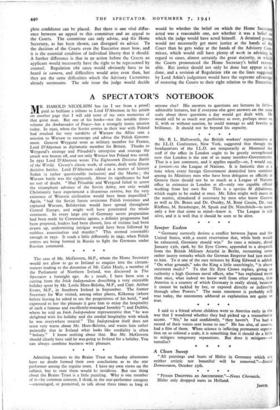A SPECTATOR'S NOTEBOOK
MR. HAROLD NICOLSON has (as I see from a proof) paid so brilliant a tribute to Lord D'Abemon in his article on another page that I will add none of my own memories of that great man. But one of his books—not the notable three- volume An Ambassador of Peace—has a strangely ironic interest
today. In 192o, when the Soviet armies in their war with Poland had reached the very outskirts of Warsaw the Allies sent a mission to Warsaw to encourage and advise the Polish Govern-
ment. General Weygand went as military member for France,
Lord D'Abernon as diplomatic member for Britain. Thanks to Weygand's strategy and Pilsudski's enterprise and courage the attack was beaten off, and not only Warsaw but Poland was saved. In 1931 Lord D'Abernon wrote The Eighteenth Decisive Battle of the World. Creasy's classic work, of course, dealt with fifteen decisive battles. Lord D'Abernon added as a matter of history Sedan (a rather questionable inclusion) and the Marne ; the Warsaw battle was the eighteenth. About its significance he had no sort of doubt. " Had Pilsudski and Weygand failed to arrest the triumphant advance of the Soviet Army, not only would Christianity have experienced a disastrous reverse, but the very existence of Western civilisation would have been imperilled." Again, " had the Soviet forces overcome Polish resistance and captured Warsaw, Bolshevism would have spread throughout Central Europe, and might well have penetrated the whole continent. In every large city of Germany secret preparation had been made by Communist agents, a definite programme had been prepared, leaders had been chosen, lists of victims had been drawn up, undermining intrigue would have been followed by ruthless assassination and murder." This seemed reasonable enough in 193r. It reads a little differently in 1941, when Polish armies are being formed in Russia to fight the Germans under Russian command.
* * * *






















 Previous page
Previous page